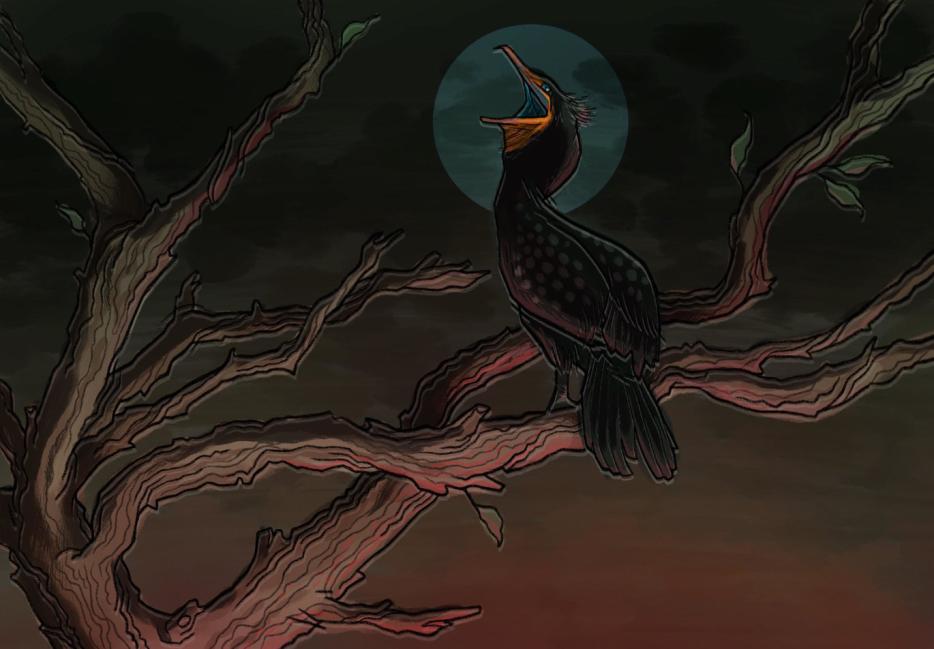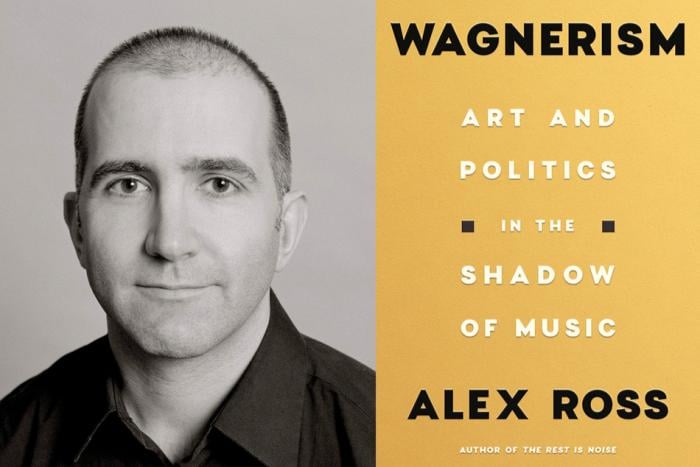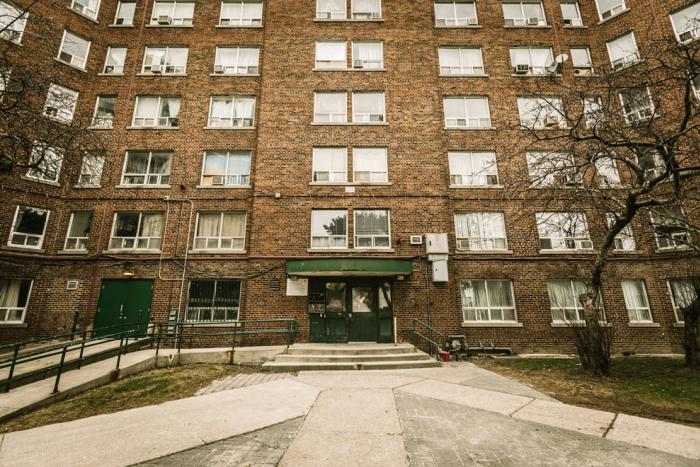What were we obsessed with, invested in, and beset by in 2020? Hazlitt’s writers reflect on the issues, big and small. Keep up with this year's series here.
-
notes from a suicide [abandoned]
-
When it all began to end, I took to wandering—up and down, to and fro—the grey sink rim of the city’s waterfront.
Shuffling past the other occasional pilgrim-patients hunched in masks, all of us ridiculous and shapeless and sad, I kept seeing a strange bird in the harbor that I didn’t know. Setting itself while it worked at a careful but busied distance from the rough affability of the mallards and screeching anxiety of the gulls, it was black, angular, and ugly, riding low in the bobbing water before hook-stitching under and surfacing a few minutes and masts away—a puzzled, furious punctuation-mark of a thing, perplexed and perplexing.
I’m not much of a birder (though quarantine has made me more sensitive and invested in their comings and goings—my head divebombed by a furious cheeping redwinged blackbird mother in June, listening for the backyard laserbeams of cardinals in August) and I thought it must be some kind of heron.
But then one day near dawn, I saw one of these unlovely beasts on the wood of the dock, in perfect stillness fanning its wings outstretched in the early sun, and I realized what I was looking at.
It was a cormorant.
-
Jesus spent forty days alone wandering the wilderness. Before the pandemic that robbed this year from us, the feat of that used to sound impressive to me.
Strictly speaking, quarantine means simply forty—a quarantena of forty days was the length of time, for example, that ships and crew were required to remain in dock in Renaissance Venice’s bustling commercial ports during the worst years of plague. But the word quarantine’s earliest attestations in English in fact refer very specifically to the desert isolation and subsequent temptation that begins Jesus’ ministry in the synoptic Gospels.
Oxford scholar William Wey, for example, while making a fastidiously documented pilgrimage to Palestine in the 1470s, described the vista of the vast waste Christ was said to have wandered:
“By yonde ys a wyldernys of quarentyne, Wher Cryst wyth fastyng hys body dyd pyne; In that holy place, as we rede, The deuyl wold had of stonys bred.”
Similarly in the Stations of Jerusalem, written around 1500 and forming a compendium of tourist diaries analogous to Wey’s, we can see the word “Quarantine” morph into a proper name for this area itself:
“And after we..turnyd vp to Quaryntyne, There Jhesu fastyd xl deys.”
It has been seven times forty days now, and the “wilderness of quarantine” still yawns before us: skies now ashen and sober, leaves now withered and sere, of a year most immemorial. And this story feels now changed to me.
The climax will unspool differently depending on which Gospel you read. Matthew (assiduous, conciliatory, eager to make his Jesus a palatable fulfiller of law rather than breaker of it) makes the temptation to power and wealth—the kingdoms and glory of the earth—his last, because it is their access his Gospel is most mourning, most tempted by, and most must repudiate. But Luke is more desperate and fugitive.
Too long alone—too long without a good meal or the company of friends, and recognizing finally that the comforts and compromises of ease and power are never to be his, he is set upon the pinnacle’s height.
And the devil said to him: If you are the Son of God, throw yourself down from here.
And that would be proof, wouldn’t it? That this world of suffering has a purpose, and you a place in it. Surely the angels and archangels and the choirs of heaven will swoop like bats from their perches to break your fall. Surely someone will stop you. And then you will wake in the cooling bath, or your face in the sick, or in the bleached snugness of the hospital, clean and bright and hungry, and know you were spared for a greater purpose: a life worth living.
So let it show you. Jump, the devil said. And if it means anything at all to live, you will be saved.
And if not, well, what will it have mattered, anyway?
-
The cormorant is a water-bird that nature, in its cruelty, has not made waterproof. This is why while ducks, with their cheerful greasiness, perch like placid cake decorations on the waves, the cormorant looks always half-sunk, in crisis, always absurdly seeming on the edge of drowning. This is also why they must sun themselves; their soggy feathers otherwise keep them perpetually cold and wet—the evolutionary tradeoff they receive to plunge so low and so deep in pursuit of their wriggling twilight prey.
I only know this because, for the poet John Milton (into whose sink I have sunk so much of my life), the poor ill-favoured bird is an icon of the demonic. For Milton, the otherwise ungainly animal’s sunning pose—limbs outstretched, head drooping in solemn silence—is a vicious parody of the crucifixion.
In Book 4 of Paradise Lost (1667), when Satan penetrates into our reality and descends upon Eden to pervert Adam and Eve, it is as this bird he perches in disguise to watch the humans and discern how he can seduce them to ruin:
Thence up he flew, and on the Tree of Life,
The middle Tree and highest there that grew,
Sat like a Cormorant; yet not true Life
Thereby regaind, but sat devising Death
To them who liv'd; nor on the vertue thought
Of that life-giving Plant, but only us'd
For prospect, what well us'd had bin the pledge
Of immortality. So little knows
Any, but God alone, to value right
The good before him, but perverts best things
To worst abuse, or to thir meanest use (4.194-204).
The image is more evocative than even (so far as I can tell) Milton seems to have realized—the cormorant is now considered a pest, an “invasive species” though it is native to the region, by many Ontario farmers and land developers because its ferocious deforesting of branches as it roosts and its corrosively acidic droppings kill whatever tree it squats in. In nesting in the Tree of Life, then, the Cormorant-Satan foretells its destruction—turning the immortally blossoming tree into the dead wood that, in many medieval legends, would become the planks of Christ’s cross.
-
Almost every day of quarantine, now in its ninth month, I walk past the spot on the waterfront where, when I was eighteen, I almost killed myself.
The disclosure of despair is always fraught, always risking a spillage of the toxic waste it is meant to rinse and flush away. The publication of Goethe’s Sorrows of Young Werther was banned in Leipzig in 1775 for the spate of copycat suicides it is alleged to have inspired; high schools still struggle to calculate their responsibility in teaching or staging Shakespeare’s Romeo & Juliet; and more recently teen drama Thirteen Reasons Why was accused of carelessness in its handling of its radioactive freight. Voices carry; it has real consequences to breathe our sorrows, and a cultural apparatus and habit has arisen to keep these in their own quarantine.
Despair too is contagious. We share it as we shed a spore.
But this year, with the spokes and axle of our world so manifestly and catastrophically broken, the claim to “being fine” amid all this would, I think, betray even worser pathologies.
-
Once in the dark, with the DVD menu looping, he whispered my name and kissed a zigzag constellation down the meridian of my face—five marks whose scorch I can still feel to this day, like cinders cast from a splitting log. Like the coal the angel pressed to Isaiah’s mouth.
And he became my faith.
And for a few months there were comic books and bad movies and waking up tangled in each other. And then, just as suddenly there was a girl, and I realized no promises had ever been made.
And I stood exposed—bereft the confidante he had been, out on a ledge among classmates and family and my own soul who now suspected my secret but without the shelter of him to stand with. And I understood, in this sudden solitude, how broken I was.
So I set a date, and picked a spot—both calculated to speak of the wound. But both too, probably, meant to be found out—and when I agreed to discreetly meet with a counsellor, I found instead that suddenly my confidences were betrayed, and there were teachers and a careless policeman and handcuffs “for my own protection” and a squad car and a padded room and a gentle doctor explaining that in the womb my genes had been “feminized” and that is why I was so ruined.
All very tacky. All very tawdry. All very teen.
When I walk past the secluded spot I thought once to make an indecent end, it feels now like staring at last night’s campfire in the cold morning, fine white ash and bottlecaps. Instead of the ember-sting I feel cauterized—like when I was young and prone to nosebleeds and the doctor shoved what felt like a lit match up my nose and burned away, I guess, the offending tissue, and I never learned what else because I didn’t want to be impolite.
I know what it means to be suicidal, and feel like apocalypse is descending—a too-muchness, an attempt (feeble and desperate and sad) to wrench meaning into life. But I don’t know what to do with a bleached, bare aftermath.
-
In the 350 years since Milton jammed the devil down its throat, the cormorant’s reputation has not much improved. On July 31, 2020, Ontario’s Ministry of Natural Resources and Forestry startled conservationists and scientists alike when it declared that the cormorant, once almost wiped out by the profligate use of insecticide DDT, was now subject to a province-wide open hunting season annually from September 15th to December 31st. With a game license you can officially kill up to 15 a day, if you like—not that the Ford government has required any official disclosure of the slaughter.
Birdwatcher and fisherman Bruce Cox has expressed dismay at this casual carelessness:
The Ministry of Natural Resources dug deep into their Orwellian thesaurus and announced Ontario’s newest sport hunt as a “fall harvest” of the double-crested cormorant. […] What is the government’s goal? A 10-per-cent reduction in cormorant numbers? Fifty per cent? More or less? The unmanaged hunt of an inedible native bird that was virtually wiped out in Ontario but for a couple of dozen nesting pairs presents an ethical dilemma for conservation-minded hunters and anglers. With no management plan in place, the hunt is at best almost completely devoid of scientific grounding, and at worst, live target practice.
The cormorant hunt, seemingly mindless in its perversity, is actually quite coherent as part of Premier Ford’s project to “open up chunks of the Greenbelt” for development. The province’s “Protect, Support, and Recover from COVID-19 Act,” for example, instead of managing the mounting viral threat, contains a suite of provisions to rewrite environmental laws, including a stripping away of conservation experts consultation and regulatory power over wetlands, forests, and flooding. It is “not policy and institutional reform,” remarked the Greenbelt Council’s David Crombie in his resignation letter, so much as “high-level bombing.”
With the earth’s principalities and powers at the foot of the tree throwing dice for its raiment, it now seems the crown jewel of Ford’s “COVID recovery” consists mostly of the paving of the provincial wetland to put up a casino parking lot.
mi ritrovai per una selva oscura
ché la diritta via era smarrita
I discovered myself in a dark wood
and found that I was lost
In the seventh circle of Hell, Dante’s pilgrim, who began the journey hinting at his own self-destructive despair, finds himself plunged into the Forest of Suicides. There, the souls of the dead are now trapped immobilized in trees whose limbs and trunks are painfully thrashed, denuded, and befouled by an infestation of harpies. More grisly still, the tormented Pietro della Vigna tells the horrified pilgrim, when the Last Judgment returns their flesh to these spirits, these souls will instead have their inert bodies cast into their boughs like ragdolls, impaled on their branches by God like a shrike.
This is supposed to be a far-cast vision of sadistic justice to come—the body that was carelessly thrown away thrown back just as carelessly—but instead it seems to me to figure the particular somatic experience, which the exiled and lonely Dante is like to have known intimately, of what it feels like to be lost to oneself.
I have tried many times to anatomize what precisely quarantine has done to me. The first hundred days, all alone in a small apartment, without human touch or voice, I felt parts of my self slough off and fall away. My skin buzzed; tears came from a dull, flat depth, and then just one day altogether stopped; my face felt nailed on and my actions distant, as though all of who I was was suspended in some foul aspic of bone and fat. I became aerosol, a fibre-optic showpig, and the flesh of my body now feels like a piece of outdated hardware, drawered in a tangle of wires, its battery corroding.
This virus is supposed to steal people’s sense of smell and taste. It feels like while I hid I engineered it myself, in my bones.
There have been the real, measurable losses and indignities as well. My beard is suddenly grizzled, the coarse white hairs startling those who have not seen me in a year. My right ear has failed, my hearing lost to a mass of internal scar tissue. With it went my ability, however meager, to sing. It was never a great voice, but it was a little joy—a bellowing to bad musicals that has doubtless annoyed neighbours for decades. Now there is just a waterbird croak.
There were the funerals, shameful in their inadequacy: grief smothered in antiseptic and gauze, maimed rites for kind people who deserved so much better a goodbye.
-
And now a second wave is cresting. They say it will be more brutal than the first—the pandemic bursting lungs like wineskins, with all the world again closed and everyone far away and under cover, and I feel myself shrink and harden like a fist at another season of these desolations.
“God never gives us more than we can handle” has always seemed to me a very obnoxious sentiment from a religion whose founder died a brutal death on a torture post. God gives all of us more than we can handle; that seems to be something rather close to the point.
I am, I admit, in despair. I do not believe that is a moral failing. Faith, hope, and love aren’t states we can will ourselves into—grace comes when it will come. Hope is just something I will have to hope for.
I imagine I will survive. I have survived till now. On the ledge and on the water.
-
In the water of the harbor is the mismade cormorant. Unloveable, inedible, no song but a guttered grumble. Wet and cold.
Waiting for the sun.






